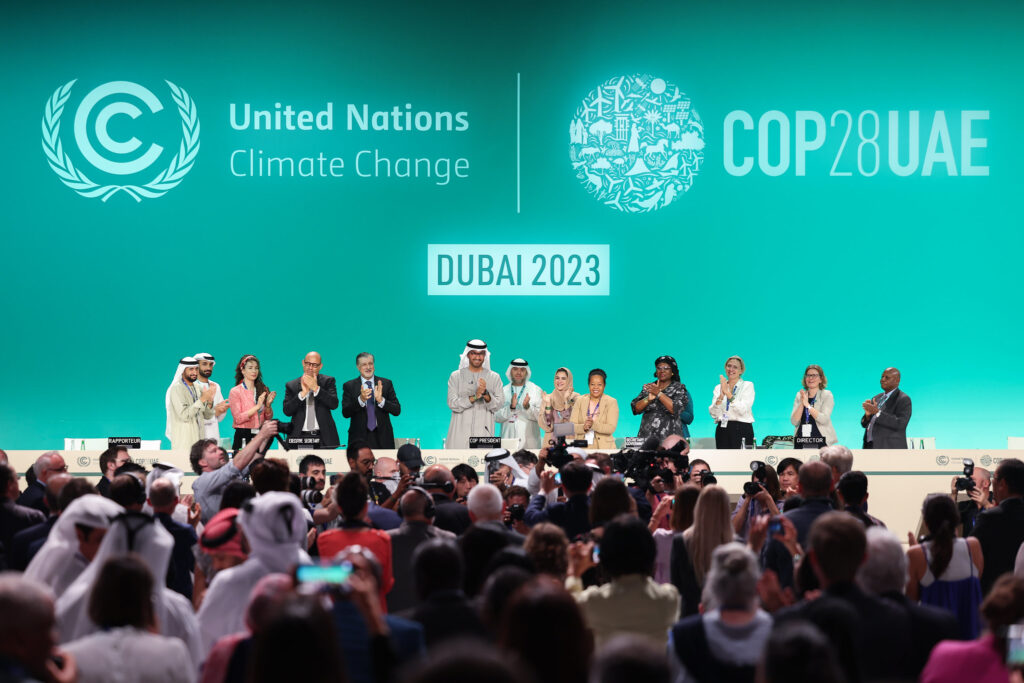By Julio Bin, Healthy Families South Auckland

Image credit: UN Climate Change
This opinion piece examines several declarations and documents that could possibly shift towards transformative change in the food system. These include:
● COP28 Declaration on sustainable agriculture, resilient food systems, and climate action
● COP28 Declaration on climate and health
● Food and Agriculture Organization Roadmap
● The United Nations global emphasis on sustainable food systems
● The Good Food Road Map
The 2023 United Nations climate change conference (COP28) marked a pivotal moment in the COP history where for the first time since the inaugural COP in 1995, the link between climate change, sustainable agriculture, and public health became a critical focal point.
At COP28’s opening speech, King Charles stressed the imperative for swift action, saying: “Unless we rapidly repair and restore nature’s economy, our own economy and survivability will be imperilled”. This urgency resonates with the three-year Food and Agriculture Organization (FAO) roadmap that spans across COP28, COP29, and COP30. The call to action is rooted in the interconnected principles of food security, nutrition, and climate action.
The FAO roadmap presents a comprehensive vision for transforming agrifood systems. COP28 serves as the initiation, providing a global perspective, while COP29 delves into regional specifics, incorporating a financial dimension. COP30 culminates in the unveiling of “country action plans”, emphasising monitoring and accountability.
A central theme throughout the declarations and the FAO roadmap is the call to break down silos.
Tackling inequalities within and across nations assumes a critical role, recognising that equitable progress is indispensable for sustained transformation. The roadmap strategically targets ten domains, reflecting a comprehensive approach grounded in evidence gathered across diverse sectors.
One of the key domains is health and wellbeing, which has been somewhat under the radar considering the direct and indirect costs of dealing with chronic illnesses like diabetes, obesity and heart diseases. This sheds light on the profound impact of inadequate access to good and affordable food on health-related diseases, highlighting the need for systemic changes in the food system.
As noted by Tedros Ghebreyesus, Director-General of the World Health Organization: “Prioritising health is not just a choice; it is the foundation of resilient societies”.
It is paramount that governments and decision-makers use systems change approach to address all conditions that are keeping the problem in place, targeting the root causes of systemic issues.
There are plenty of well-structured stand-alone initiatives in New Zealand that together, can create a positive movement towards a resilient and sustainable food system; but they need strategic support and guidance to leverage the work required to deliver transformational change.
As a country, we have the necessary resources and collective intelligence to organise, motivate and implement a set of game-changing initiatives. On top of that, the New Zealand Bill of Rights Act 1990 outlines legally binding international obligations, including the “Right to nutritious food for positive health outcomes”.
If we collectively decide and act towards a resilient and sustainable food system, we can achieve transformative changes across all sectors in a few years, not decades, positively influencing climate related mitigation and recovery plans.
Mariam Almheiri, the COP28 Food Systems Lead, stresses that: “Countries must put food systems and agriculture at the heart of their climate ambitions”. This is brought to light in the COP28 Declaration on Climate and Health, underlining the inseparable link between agrifood systems, health, and climate.
Local and central governments play a crucial role in supporting the necessary changes in the food system to address the health and wellbeing of people and the environment, requiring actively engagement with all stakeholders, including farmers, businesses, and communities, to create a more sustainable, equitable, and resilient food system.
The integration of health considerations into policies, regulations and planning is essential. Navigating the landscape of transformative change, the Good Food Road Map (GFRM) emerges as a strategic framework aligned with the FAO roadmap.
It serves as a compass for decision-making and initiative development across New Zealand, emphasising transformative shifts in dietary patterns, rethinking the supply and demand for good food in a way that communities can became food resilient.
The GFRM envisions that everyone in Aotearoa New Zealand should be able to access good and affordable food at all times via resilient and sustainable food systems, which directly aligns with the FAO’s commitment to ensuring sustenance, equity, and the responsible use and protection of the natural environment.
The urgency for transformative change calls for active participation from individuals, communities, and governments, as outlined in the Good Food Road Map five scenarios for a resilient and sustainable food system:
1. Accessible and Affordable Good Food: Ensuring that everyone has access to affordable and nutritious food, addressing the health and wellbeing of the population.
2. Regenerative Agriculture: Promoting environmentally sustainable farming practices that contribute to the health of the land and communities.
3. Zero Food Waste: Implementing strategies to reduce food waste and waste of food, ensuring efficient use of resources and minimising environmental impact.
4. Sustainable, Resilient and Fair Food Supply Chains: Building robust and equitable food supply chains that support local communities and contribute to economic resilience.
5. Cultural Connection to Food: Fostering a deeper connection to food, celebrating cultural diversity, and recognising the role of food in building healthier and resilient communities.
Embracing these ideals requires collective action, advocacy, and commitment. By aligning individual choices with these overarching goals, we can contribute to a not-too-distant future where health, wellbeing, and environmental stewardship are at the forefront of our priorities.
This ‘movement’ has already started in Aotearoa New Zealand and the targets outlined at COP28 supports this transformative journey. The interplay between the COP28 declarations, the FAO roadmap, and the Good Food Road Map underscores the imperative cooperation and coordination in steering local progress.
As we prioritise health, address inequalities and safeguard the environment through strategic alignment and collective commitment, we can actually usher in a transformative era in food systems, uniting businesses, communities and governments in a shared narrative of resilience and sustainability.